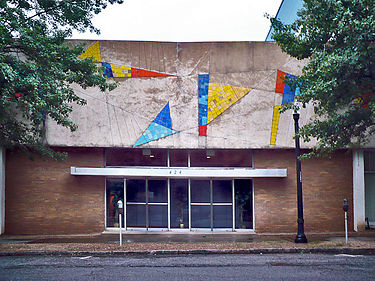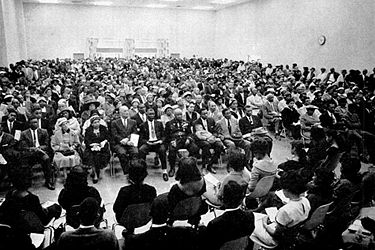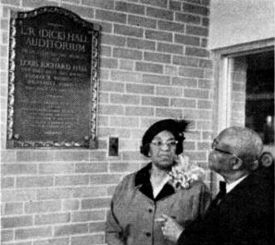L. R. Hall Auditorium: Difference between revisions
No edit summary |
|||
| (12 intermediate revisions by 3 users not shown) | |||
| Line 1: | Line 1: | ||
[[Image:L R Hall Auditorium.jpg|right|thumb| | [[Image:L R Hall Auditorium.jpg|right|thumb|375px|L. R. Hall Auditorium in August 2008]] | ||
The '''L. R. Hall Auditorium''' is a 500-seat auditorium located in the [[A. G. Gaston Building]] at 424 [[16th Street North]]. The Gaston Building is an office building constructed in [[ | The '''L. R. (Dick) Hall Auditorium''' is a 500-seat auditorium located in the [[A. G. Gaston Building]] at 424 [[16th Street North]]. The Gaston Building is an office building constructed in [[1960]] by business magnate [[A. G. Gaston]] in the [[Historic 4th Avenue District]]. The building, named for [[Louis Hall|Louis Richard Hall]], was designed in the international style by a firm from St Louis, Missouri. It is currently owned by Dr [[Richard Walker]]. | ||
The auditorium was | The auditorium was used for the [[Southern Christian Leadership Conference]] held its [[1962 SCLC Conference|annual conference]] held on [[September 24]]–[[September 28|28]], [[1962]]. During SCLC president [[Martin Luther King Jr]]'s final report, a young Nazi jumped onto the stage and hit King twice. [[Ralph Abernathy]] and [[Wyatt Tee Walker]] intervened, and others calmed the crowd. King spoke briefly backstage with the man, identified as Roy James of Arlington, Virginia, and declined to press criminal charges. Nevertheless, public safety commissioner [[Bull Connor]] prosecuted James for assault. Judge [[Charles Brown]] sentenced him to 30 days. Rosa Parks, in attendance at the conference, was deeply moved by King's demonstration of non-violence. | ||
Such outbursts of violence and the growing [[list of racially-motivated bombings]] led Gaston to become reluctant for the auditorium to be used for movement events. A scheduled performance by Al Hibbler, a blind singer who traveled from New Jersey to support the movement for Civil Rights, was canceled hours before it was to have begun. (Huntley & Montgomery-2004, Eskew-1997) | |||
A [[2003]] renovation commissioned by [[SouthPace Properties]] preserved the building's original style while updating its commercial spaces. The renovation was designed by [[Bob Moody]] and carried out by [[Charles & Vinzant]]. | A [[2003]] renovation commissioned by [[SouthPace Properties]] preserved the building's original style while updating its commercial spaces. The renovation was designed by [[Bob Moody]] and carried out by [[Charles & Vinzant]]. | ||
In Spring [[2007]] the Auditorium became the home of the [[Ebenezer Victory Empowerment Church]]. In addition to weddings and youth rallies, the L. R. Hall Auditorium hosts frequent late-night events organized by [[Fresh Affairs Entertainment]] and others. | In Spring [[2007]] the Auditorium became the home of the [[Ebenezer Victory Empowerment Church]]. In addition to weddings and youth rallies, the L. R. Hall Auditorium hosts frequent late-night events organized by [[Fresh Affairs Entertainment]] and others. In [[2009]] and early [[2010]] it was the home of [[The Rock Church (downtown)|The Rock Church]]. | ||
[[Image:LR Hall Aud interior 1960.jpg|left|thumb|375px|The dedication ceremony for the opening of the A. G. Gaston Building was held in the L. R. Hall Auditorium]] | |||
[[Image:L R Hall plaque 1960.jpg|right|thumb|none|275px|Mrs L. R. Hall is shown the dedicatory plaque by A. G. Gaston in 1960]] | |||
<br /> | |||
==Controversy over youth parties== | ==Controversy over youth parties== | ||
In December [[2001]] the issue of "teenage parties" occurring at the auditorium came before the City Council when a license to serve alcohol for special events was approved. During a hearing the Council heard testimony from [[Arthur Shores Lee]] and from representatives of the auditorium, who said that they had placed a moratorium on youth parties until complaints could be addressed. (Reynolds - 2001) | In December [[2001]] the issue of "teenage parties" occurring at the auditorium came before the City Council when a license to serve alcohol for special events was approved. During a hearing the Council heard testimony from [[Arthur Shores Lee]] and from representatives of the auditorium, who said that they had placed a moratorium on youth parties until complaints could be addressed. (Reynolds - 2001) | ||
At the [[July 15]] and [[August 19]], [[2008]] meetings of the [[Birmingham City Council]], Mayor [[Larry Langford]] complained about out-of-control youth at the location, requiring heavy police response. In the August meeting he called the hall a public nuisance and asked the city to have it shut down, predicting that "this is another Banana Joe's in the making." (Bryant - 2008) | At the [[July 15]] and [[August 19]], [[2008]] meetings of the [[Birmingham City Council]], Mayor [[Larry Langford]] complained about out-of-control youth at the location, requiring heavy police response. In the August meeting he called the hall a public nuisance and asked the city to have it shut down, predicting that "this is another [[Banana Joe's]] in the making." (Bryant - 2008) | ||
In response, Walker said that he would no longer allow teen parties at the auditorium. Langford welcomed the offer, but said his license should still be revoked for past behavior. After a public hearing, the [[Birmingham City Council]] agreed and asked [[Jefferson County Circuit Court]] Judge [[Mike Graffeo]] to issue a restraining order to prevent the hall from being used. | In response, Walker said that he would no longer allow teen parties at the auditorium. Langford welcomed the offer, but said his license should still be revoked for past behavior. After a public hearing, the [[Birmingham City Council]] agreed and asked [[Jefferson County Circuit Court]] Judge [[Mike Graffeo]] to issue a restraining order to prevent the hall from being used. | ||
Graffeo's temporary ruling allowed the auditorium to continue operating under the condition that parties for teenagers and high-schoolers were prohibited, a weekly schedule of events | Graffeo's temporary ruling allowed the auditorium to continue operating under the condition that parties for teenagers and high-schoolers were prohibited, a weekly schedule of events had to be given to city officials, and off-duty police officers had to be hired for security during events. Walker claimed to have abided by all those stipulations, but a fatal stabbing during a May [[2011]] event at the auditorium led the City Council to resume deliberations over the fate of the venue. On [[June 28]] they voted, 8-0, to again declare the hall a public nuisance and revoke Walker's license to operate it as a business. | ||
==References== | ==References== | ||
| Line 22: | Line 27: | ||
* Birmingham Historical Society (May 2003) "Birmingham Historical Society 2003 Preservation Awards." ''Birmingham Historical Society Newsletter''. p. 2 | * Birmingham Historical Society (May 2003) "Birmingham Historical Society 2003 Preservation Awards." ''Birmingham Historical Society Newsletter''. p. 2 | ||
* Huntley, H. and D. Montgomery, eds. (2004) ''Black Workers' Struggle for Equality in Birmingham''. Champaign, Illinois: University of Illinois Press, p.198 | * Huntley, H. and D. Montgomery, eds. (2004) ''Black Workers' Struggle for Equality in Birmingham''. Champaign, Illinois: University of Illinois Press, p.198 | ||
* Bryant, Joseph D. (August 19, 2008) "Birmingham mayor calls L.R. Hall Auditorum a public nuisance." | * Bryant, Joseph D. (August 19, 2008) "Birmingham mayor calls L.R. Hall Auditorum a public nuisance." {{BN}} | ||
* Norris, Toraine and Joseph Bryant (August 19, 2008) "L R Hall owner says teen parties will be stopped." | * Norris, Toraine and Joseph Bryant (August 19, 2008) "L R Hall owner says teen parties will be stopped." {{BN}} | ||
* Bryant, Joseph and Eric Velasco (August 25, 2008) "L R Hall owner says teen parties will be stopped." | * Bryant, Joseph and Eric Velasco (August 25, 2008) "L R Hall owner says teen parties will be stopped." {{BN}} | ||
* Bryant, Joseph D. (August | * Bryant, Joseph D. (August 29, 2008) "Judge lets L.R. Hall reopen with restrictions." {{BN}} | ||
* Garrison, Greg (February 12, 2011) "Rocking the Rock: Forestdale church emerges as magnet for young families." {{BN}} | |||
* Bryant, Joseph D. (June 29, 2011) "Birmingham council orders L.R. Auditorium closed after slaying, history of other violence." {{BN}} | |||
* Parr, Patrick (January 18, 2021) "When a Nazi punched Dr. King: A story about radicalism, violence and helping unify America." ''New York Daily News'' | |||
{{DEFAULTSORT:Hall Auditorium}} | |||
[[Category:Concert venues]] | [[Category:Concert venues]] | ||
[[Category:Event spaces]] | [[Category:Event spaces]] | ||
[[Category: | [[Category:A. G. Gaston Building]] | ||
[[Category: | [[Category:1960 establishments]] | ||
[[Category:2011 disestablishments]] | |||
Latest revision as of 15:48, 15 January 2024
The L. R. (Dick) Hall Auditorium is a 500-seat auditorium located in the A. G. Gaston Building at 424 16th Street North. The Gaston Building is an office building constructed in 1960 by business magnate A. G. Gaston in the Historic 4th Avenue District. The building, named for Louis Richard Hall, was designed in the international style by a firm from St Louis, Missouri. It is currently owned by Dr Richard Walker.
The auditorium was used for the Southern Christian Leadership Conference held its annual conference held on September 24–28, 1962. During SCLC president Martin Luther King Jr's final report, a young Nazi jumped onto the stage and hit King twice. Ralph Abernathy and Wyatt Tee Walker intervened, and others calmed the crowd. King spoke briefly backstage with the man, identified as Roy James of Arlington, Virginia, and declined to press criminal charges. Nevertheless, public safety commissioner Bull Connor prosecuted James for assault. Judge Charles Brown sentenced him to 30 days. Rosa Parks, in attendance at the conference, was deeply moved by King's demonstration of non-violence.
Such outbursts of violence and the growing list of racially-motivated bombings led Gaston to become reluctant for the auditorium to be used for movement events. A scheduled performance by Al Hibbler, a blind singer who traveled from New Jersey to support the movement for Civil Rights, was canceled hours before it was to have begun. (Huntley & Montgomery-2004, Eskew-1997)
A 2003 renovation commissioned by SouthPace Properties preserved the building's original style while updating its commercial spaces. The renovation was designed by Bob Moody and carried out by Charles & Vinzant.
In Spring 2007 the Auditorium became the home of the Ebenezer Victory Empowerment Church. In addition to weddings and youth rallies, the L. R. Hall Auditorium hosts frequent late-night events organized by Fresh Affairs Entertainment and others. In 2009 and early 2010 it was the home of The Rock Church.
Controversy over youth parties
In December 2001 the issue of "teenage parties" occurring at the auditorium came before the City Council when a license to serve alcohol for special events was approved. During a hearing the Council heard testimony from Arthur Shores Lee and from representatives of the auditorium, who said that they had placed a moratorium on youth parties until complaints could be addressed. (Reynolds - 2001)
At the July 15 and August 19, 2008 meetings of the Birmingham City Council, Mayor Larry Langford complained about out-of-control youth at the location, requiring heavy police response. In the August meeting he called the hall a public nuisance and asked the city to have it shut down, predicting that "this is another Banana Joe's in the making." (Bryant - 2008)
In response, Walker said that he would no longer allow teen parties at the auditorium. Langford welcomed the offer, but said his license should still be revoked for past behavior. After a public hearing, the Birmingham City Council agreed and asked Jefferson County Circuit Court Judge Mike Graffeo to issue a restraining order to prevent the hall from being used.
Graffeo's temporary ruling allowed the auditorium to continue operating under the condition that parties for teenagers and high-schoolers were prohibited, a weekly schedule of events had to be given to city officials, and off-duty police officers had to be hired for security during events. Walker claimed to have abided by all those stipulations, but a fatal stabbing during a May 2011 event at the auditorium led the City Council to resume deliberations over the fate of the venue. On June 28 they voted, 8-0, to again declare the hall a public nuisance and revoke Walker's license to operate it as a business.
References
- Eskew, Glenn T. (1997) But for Birmingham: The Local and National Movements in the Civil Rights Struggle. Chapel Hill, North Carolina: UNC Press. ISBN 0807846678, p. 231
- Reynolds, Ed (December 11, 2001) "Teen parties create mayhem." Black & White
- Birmingham Historical Society (May 2003) "Birmingham Historical Society 2003 Preservation Awards." Birmingham Historical Society Newsletter. p. 2
- Huntley, H. and D. Montgomery, eds. (2004) Black Workers' Struggle for Equality in Birmingham. Champaign, Illinois: University of Illinois Press, p.198
- Bryant, Joseph D. (August 19, 2008) "Birmingham mayor calls L.R. Hall Auditorum a public nuisance." The Birmingham News
- Norris, Toraine and Joseph Bryant (August 19, 2008) "L R Hall owner says teen parties will be stopped." The Birmingham News
- Bryant, Joseph and Eric Velasco (August 25, 2008) "L R Hall owner says teen parties will be stopped." The Birmingham News
- Bryant, Joseph D. (August 29, 2008) "Judge lets L.R. Hall reopen with restrictions." The Birmingham News
- Garrison, Greg (February 12, 2011) "Rocking the Rock: Forestdale church emerges as magnet for young families." The Birmingham News
- Bryant, Joseph D. (June 29, 2011) "Birmingham council orders L.R. Auditorium closed after slaying, history of other violence." The Birmingham News
- Parr, Patrick (January 18, 2021) "When a Nazi punched Dr. King: A story about radicalism, violence and helping unify America." New York Daily News


